 We left the Louvre museum and walked backed down along the river Seine towards
Notre Dame - we are on the Right Bank. In order to attract tourists this summer (2003) the Parisians dumped
sand along the banks of the Seine and called it "The Beach of Paris". Along with
the sand they put out
umbrellas and sprinklers for the bathers.
We left the Louvre museum and walked backed down along the river Seine towards
Notre Dame - we are on the Right Bank. In order to attract tourists this summer (2003) the Parisians dumped
sand along the banks of the Seine and called it "The Beach of Paris". Along with
the sand they put out
umbrellas and sprinklers for the bathers.
|
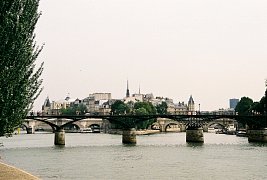 We are heading for Sainte-Chapelle, the spire of which appears in the center of this
picture. Sainte-Chapelle is on the Ile de la Cité, which is located in the
middle of the river Seine.
We are heading for Sainte-Chapelle, the spire of which appears in the center of this
picture. Sainte-Chapelle is on the Ile de la Cité, which is located in the
middle of the river Seine.
|
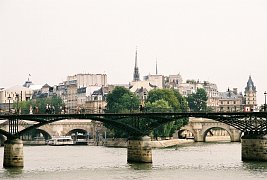 The Ile de la Cité is the cradle of Parisian civilization. It was here that the Parisii
tribe lived; the Romans, led by Caesar's lieutenant Labenius, conquered the Parisii in 52 AD
and set up camp. The city was given the name Lutecia, from the Latin lutum meaning "mud".
During the barbarian invasion, Lutecia's inhabitants, galvanized by the young Sainte
Geneviève, took refuge on the easily defended Ile de la Cité. Clovis, king of the Francs
who bested the Romans, made the island his capital. It stayed the area's center
of activity throughout the Middle ages.
The Ile de la Cité is the cradle of Parisian civilization. It was here that the Parisii
tribe lived; the Romans, led by Caesar's lieutenant Labenius, conquered the Parisii in 52 AD
and set up camp. The city was given the name Lutecia, from the Latin lutum meaning "mud".
During the barbarian invasion, Lutecia's inhabitants, galvanized by the young Sainte
Geneviève, took refuge on the easily defended Ile de la Cité. Clovis, king of the Francs
who bested the Romans, made the island his capital. It stayed the area's center
of activity throughout the Middle ages.
|
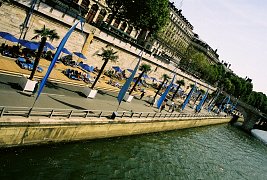
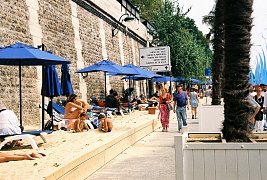 Sorry about the picture on the far left - I suggest you tilt your head. We walk along the Beach of Paris.
Sorry about the picture on the far left - I suggest you tilt your head. We walk along the Beach of Paris.
|

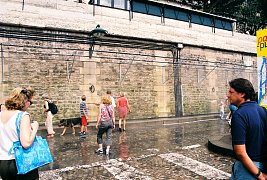 It reached 104 Fahrenheit this particular afternoon - these spray areas
felt great to walk through. This summer was officially the hottest European
summer
in the last 500 years.
It reached 104 Fahrenheit this particular afternoon - these spray areas
felt great to walk through. This summer was officially the hottest European
summer
in the last 500 years.
|
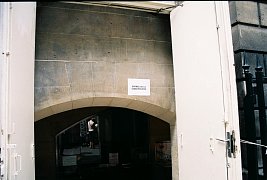 We are now on the Ile de la Cité about to go down some stairs into La Conciergerie.
Part of the first palace of the kings of France (They later moved to the Louvre palace),
La Conciergerie became the first Paris prison in 1391.
La Conciergerie became famous during the 1789 French revolution: in 1793
and 1794, 2780 men and women were sentenced to death and detained in the Conciergerie
until they left for Concorde square where they were beheaded. Marie-Antoinette,
queen of France and sister of the king of Austria, was among them.
We are now on the Ile de la Cité about to go down some stairs into La Conciergerie.
Part of the first palace of the kings of France (They later moved to the Louvre palace),
La Conciergerie became the first Paris prison in 1391.
La Conciergerie became famous during the 1789 French revolution: in 1793
and 1794, 2780 men and women were sentenced to death and detained in the Conciergerie
until they left for Concorde square where they were beheaded. Marie-Antoinette,
queen of France and sister of the king of Austria, was among them.
|

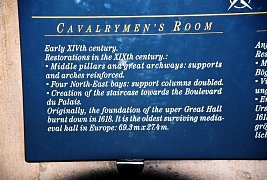 The Conciergerie well deserves a visit for its history and Gothic architecture. It includes three
superb Gothic halls from the 14th century.
This picture of the Cavalrymen's room (left) - one of the halls - turned out great.
The Conciergerie well deserves a visit for its history and Gothic architecture. It includes three
superb Gothic halls from the 14th century.
This picture of the Cavalrymen's room (left) - one of the halls - turned out great.
|
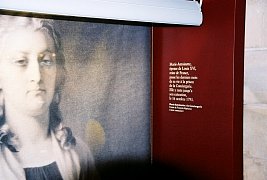 La Conciergerie, as previously mentioned, is where Marie Antoinette was held prior to her execution during the
French Revolution. The original rooms
she occupied were destroyed when parts of the prison were re-configured.
La Conciergerie, as previously mentioned, is where Marie Antoinette was held prior to her execution during the
French Revolution. The original rooms
she occupied were destroyed when parts of the prison were re-configured.
|
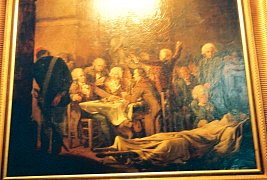 During the night of 29/30 October 1793 twenty one deputies may have waited for
their deaths in this chapel. Condemned a few hours earlier by the Revolutionary
Tribunal, they belonged to a group called "Girondin". Some of them, including
Brissot, Vergniand and Gensonne', were famous and had led the revolutionary movement for a while
(up to 31 May 1793). According to tradition, they gathered together on their last night
for a fraternal banquet, probably in the prison chapel, while one of them,
Dufriche-Valaze', lay dead after committing suicide by plunging a stiletto in his
heart. The following century the Romantic movement was inspired by this legend.
During the night of 29/30 October 1793 twenty one deputies may have waited for
their deaths in this chapel. Condemned a few hours earlier by the Revolutionary
Tribunal, they belonged to a group called "Girondin". Some of them, including
Brissot, Vergniand and Gensonne', were famous and had led the revolutionary movement for a while
(up to 31 May 1793). According to tradition, they gathered together on their last night
for a fraternal banquet, probably in the prison chapel, while one of them,
Dufriche-Valaze', lay dead after committing suicide by plunging a stiletto in his
heart. The following century the Romantic movement was inspired by this legend.
The picture isn't very good - sorry.
|











